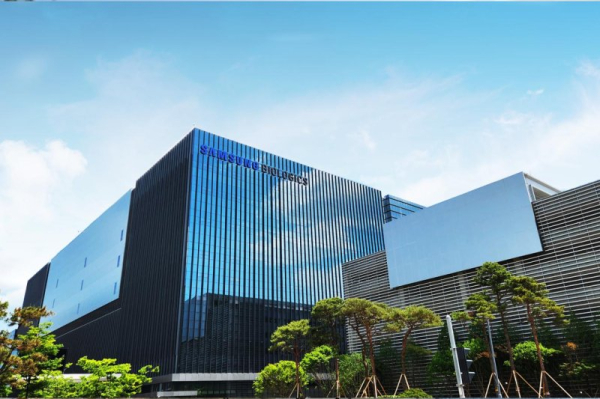Biopharmaceutical contract manufacturers record strong growth.


1 of 2 | South Korean biopharmaceutical contract manufacturer Samsung Biologics posted a stellar performance in the first half of this year. Photo courtesy of Samsung Biologics
The South Korean economy struggles as the country’s gross domestic product growth rate is feared to more than halve to less than 1% this year, compared to 2% for 2024.
However, its defense and shipbuilding industries are faring well. Also among the high achievers are biopharmaceutical contract manufacturers, including Samsung Biologics and Celltrion.
Samsung Biologics, one of the world’s largest contract development and manufacturing organizations, or CDMOs, announced Wednesday that it posted record-high $1.88 billion in sales during the first six months of 2025, up 21.3% from a year earlier. Its operating profit amounted to $700 million, up 46.75%.
The company also said that it has signed contracts worth $2.4 billion in the first half of the year, which is more than 60% of its total annual order volume for 2024.
“As global demand for CDMO services continues to rise, we are rapidly expanding our production capacity,” Samsung Biologics said in a statement. “Backed by our world-class CDMO capabilities, we plan to intensify our efforts to win more orders, particularly targeting the world’s top 40 pharmaceutical companies.”
Samsung’s local rival, Celltrion, is likewise seeing impressive results. The outfit announced Tuesday that its first-half turnover stood at $1.31 billion, up 11.9% year-on-year. Its operating income more than tripled to $285 million.
The company’s sales for this year are expected to top $3 billion for the first time, and its bottom line is projected to near the $1 billion mark.
Observers have positive outlooks for the two powerhouses.
“Samsung Biologics is beefing up its global competitiveness through the second campus, which includes plants five to eight,” KB Securities researcher Kim Hye-min said in a market report.
“The company is also expanding its capabilities beyond traditional monoclonal antibody-focused CDMO services to next-generation modalities and pre-filled syringes,” she noted.
Prefilled syringe manufacturing means that Samsung Biologics rolls out drugs in ready-to-inject formats. Global pharmaceutical clients tend to request this for chronic diseases or biologic treatments.
Regarding Celltrion, Heungkuk Securities analyst Lee Ji-won said in a recent report that this year would be a pivotal point for the company’s profit growth momentum.
“Celltrion is predicted to demonstrate a significant year-on-year increase in profits, driven by the solid performance of newly launched high-margin biosimilars,” Lee said.
Experts said the CDMO businessm which is based on outsourced manufacturing, is an area in which Korean companies have advantages.
“Although the Korean economy languishes due to various reasons this year, the biopharmaceutical outsourcing business is likely to rack up stellar performances for the time being. Samsung Biologics and Celltrion will spearhead the trend,” Seoul-based business tracker Leaders Index CEO Park Ju-gun told UPI.
“Samsung Biologics has already become an established player in the market, favored by global biopharmaceutical giants thanks to its cost competitiveness and quick delivery. Celltrion is also trying hard to become a big name in the market,” he said.
Economic analyst Kim Joon-Kyung, formerly vice chairman at Deloitte Consulting Korea, agreed.
“First of all, the CDMO industry is promising. And from the perspective of Samsung, the business shares many characteristics with semiconductor production. Hence, the group had a good reason to tap into the CDMO sector,” Kim said in a phone interview.
“Celltrion did not have such advantages. But the company secured technological edges early on, which is quite an achievement. That’s why Celltrion is showing solid performances now,” he said.
Samsung Electronics, the mother company of Samsung Biologics, is the world’s largest maker of memory chips.
According to U.S. market intelligence firm BCC Research, the global CDMO market is expected to expand to $191.6 billion by 2029 from $136.6 billion last year based on mounting demand for outsourced drug development and manufacturing.
Other biopharmaceutical companies in Korea also are striving to tap into the lucrative CDMO business, including SK Bioscience and Lotte Biologics.
Toward that end, SK Bioscience acquired a controlling stake in IDT Biologika of Germany, which is one of the top 10 global vaccine CDMOs, late last year.
Lotte Biologics has launched operations of its antibody-drug conjugate facility at its Syracuse Bio Campus in the United States. The company also is preparing its first plant located just west of Seoul, aiming to begin commercial production in 2027.